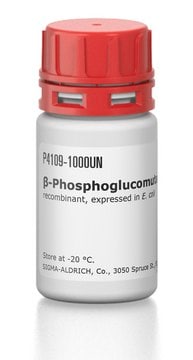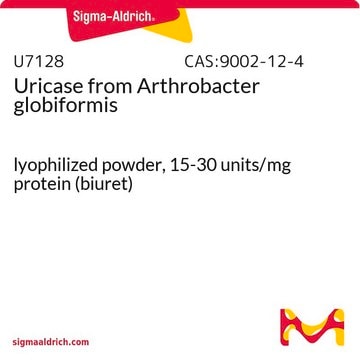Alle Fotos(1)
Wichtige Dokumente
SAE0022
Phosphoglucomutase 1 human
lyophilized powder, recombinant, expressed in E. coli
Anmeldenzur Ansicht organisationsspezifischer und vertraglich vereinbarter Preise
Alle Fotos(1)
About This Item
Empfohlene Produkte
Rekombinant
expressed in E. coli
Qualitätsniveau
Beschreibung
PGM1 isoform sequence with a predicted molecular mass of 61.3kDa.
Assay
≥95% (PAGE)
Form
lyophilized powder
Spezifische Aktivität
≥400 units/mg protein
Versandbedingung
dry ice
Lagertemp.
−20°C
Allgemeine Beschreibung
Phosphoglucomutase-1 (PGM1) is an evolutionarily conserved enzyme that belongs to the phosphohexose mutase family. It is the major isoform of PGM in skeletal muscle and most other tissues. The PGM1 gene is mapped to human chromosome 1p31.3.
Biochem./physiol. Wirkung
Phosphoglucomutase-1 (PGM1) catalyzes the bidirectional interconversion of glucose-1-phosphate (G-1-P) and glucose-6-phosphate (G-6-P). It regulates carbohydrate metabolism, energy production, and protein N-glycosylation. PGM1 participates in the biosynthesis of nucleotide sugars required for glycan biosynthesis. Variation in the PGM1 gene leads to PGM1 deficiency, which is considered an inherited metabolic disorder in humans. PGM1 deficiency causes autosomal recessive diseases such as glycogen storage disease type XIV and congenital disorder of protein N-glycosylation. Affected patients show multiple disease phenotypes, reflecting the central role of the enzyme in glucose homeostasis. The influence of PGM1 deficiency on protein glycosylation patterns is also widespread. PGM1 acts as a metabolic tumor suppressor.
Einheitendefinition
One unit will convert 1.0 μmole of α-D-Glucose-1-Phosphate to α-D-Glucose-6-phosphate per minute at pH 7.4 at 30 °C.
Physikalische Form
Supplied as a lyophilized powder containing tris-buffered saline, EDTA, DTT and stabilizer.
Lagerklassenschlüssel
11 - Combustible Solids
WGK
WGK 2
Flammpunkt (°F)
Not applicable
Flammpunkt (°C)
Not applicable
Hier finden Sie alle aktuellen Versionen:
Analysenzertifikate (COA)
Lot/Batch Number
Die passende Version wird nicht angezeigt?
Wenn Sie eine bestimmte Version benötigen, können Sie anhand der Lot- oder Chargennummer nach einem spezifischen Zertifikat suchen.
Besitzen Sie dieses Produkt bereits?
In der Dokumentenbibliothek finden Sie die Dokumentation zu den Produkten, die Sie kürzlich erworben haben.
Eva Morava
Molecular genetics and metabolism, 112(4), 275-279 (2014-07-07)
We recently redefined phosphoglucomutase-1 deficiency not only as an enzyme defect, involved in normal glycogen metabolism, but also an inborn error of protein glycosylation. Phosphoglucomutase-1 is a key enzyme in glycolysis and glycogenesis by catalyzing in the bidirectional transfer of
Guang-Zhi Jin et al.
PLoS biology, 16(10), e2006483-e2006483 (2018-10-20)
Glycogen metabolism commonly altered in cancer is just beginning to be understood. Phosphoglucomutase 1 (PGM1), the first enzyme in glycogenesis that catalyzes the reversible conversion between glucose 1-phosphate (G-1-P) and glucose 6-phosphate (G-6-P), participates in both the breakdown and synthesis
Paul Hoff Backe et al.
Scientific reports, 10(1), 5656-5656 (2020-03-30)
Human phosphoglucomutase 1 (PGM1) is an evolutionary conserved enzyme that belongs to the ubiquitous and ancient α-D-phosphohexomutases, a large enzyme superfamily with members in all three domains of life. PGM1 catalyzes the bi-directional interconversion between α-D-glucose 1-phosphate (G1P) and α-D-glucose
Wo-Tu Tian et al.
Neuromuscular disorders : NMD, 29(4), 282-289 (2019-02-10)
The congenital disorders of glycosylation are a group of clinically and biochemically heterogeneous diseases characterized by multisystem involvement due to glycosylation defect of protein and lipid. Here we report a 49-year-old man with exercise-induced fatigue and pain of muscle, tachypnea
Federica Conte et al.
Molecular genetics and metabolism, 131(1-2), 135-146 (2020-12-22)
Phosphoglucomutase 1 deficiency is a congenital disorder of glycosylation (CDG) with multiorgan involvement affecting carbohydrate metabolism, N-glycosylation and energy production. The metabolic management consists of dietary D-galactose supplementation that ameliorates hypoglycemia, hepatic dysfunction, endocrine anomalies and growth delay. Previous studies
Unser Team von Wissenschaftlern verfügt über Erfahrung in allen Forschungsbereichen einschließlich Life Science, Materialwissenschaften, chemischer Synthese, Chromatographie, Analytik und vielen mehr..
Setzen Sie sich mit dem technischen Dienst in Verbindung.





